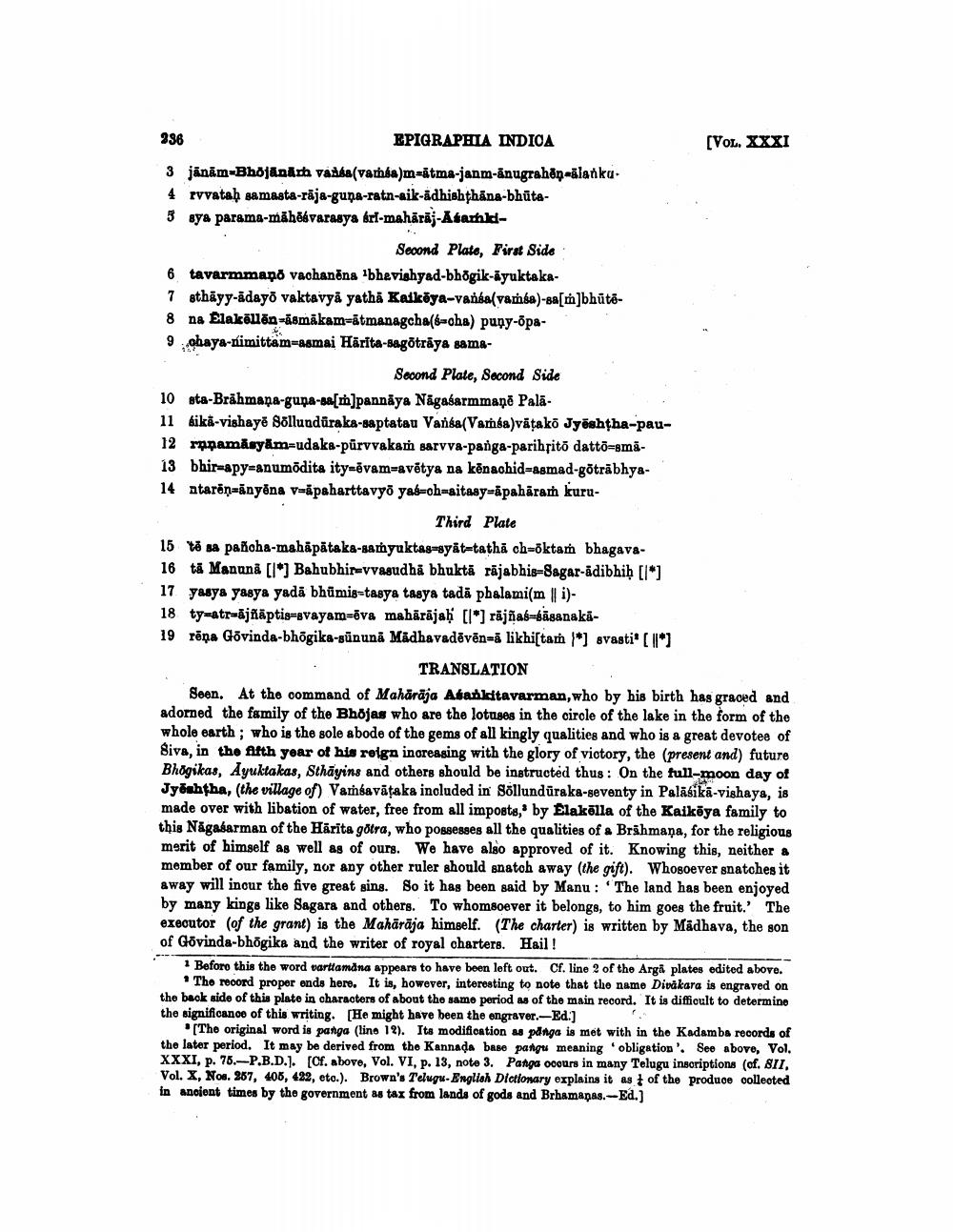________________
336
EPIGRAPHIA INDICA
[VOL. XXXI
3 jānām-Bhojänar vaška(vamba)m=ātma-janm-anugrahoņealanku. 4 rvvatab samasta-rāja-guna-ratn-aik-adhishthāna-bhūte3 aya parama-mähösvarasya bri-mahārāj-Atarhld
Second Plate, First Side 6 tavarmmand vachanēna 'bhevishyad-bhogik-ayuktaka7 sthāyy-ādayo vaktavyå yatha Kaiköya-vanka(vamsa)-ba[m]bhūtė8 na Elaköllon -āsmākam=ātmanagcha(s-cha) puny-opa9 ghaya-nimittam=asmai Harita-sagotrāya sama
Second Plate, Second Side 10 sta-Brāhmana-guna-sa[m]pannāya Nagasarmmaņē Palā. 11 sika-vishay? Sollundüraka-saptatau Vansa(Vamba)văţako Jyoshtha-pau12 rppamäsyäm=udaks-pūrvvakaṁ sarvva-panga-parihsito datto=små13 bhir-apy=anumõdita ity=ēvam=avētya na kēnachid-asmad-gotrābhya14 ntaron=ānyona vəāpaharttavyö yas-ch-aitasy=āpahāram kuru
Third Plate 15 sa pañoha-mahäpätaka-samyuktas-syättatha ch=čktam bhagava16 tā Manana (1) Bahubhiruvvasudha bhuktā rājabhis-8agar-adibhiḥ [l*) 17 yasya yasya yadā bhūmistasya tasya tada pbalami(
m i)18 ty=atr=ājääptis-avayam=ēva mahārājaḥ [l*) rājias-bisanaki19 rēna Govinda-bhõgika-sūnuna Madhavadēvēn=ā likhistam *) svasti'( ||*]
TRANSLATION Seen. At the command of Mahārāja Abanikitavarman, who by his birth has graced and adorned the family of the Bhojas who are the lotuses in the circle of the lake in the form of the whole earth; who is the sole abode of the gems of all kingly qualities and who is a great devotee of Siva, in the fifth year of his reign increasing with the glory of victory, the present and) future Bhogikas, Ayuktakas, Sthāyins and others should be instructed thus : On the full-moon day of Jyoshtha, (the village of) Vamsavätaka inoluded in Söllundüraka-seventy in Palasika-vishaya, is made over with libation of water, free from all imposts, by Elakölla of the Kaiköya family to this Nägašarman of the Härīta götra, who possesses all the qualities of a Brahmana, for the religious merit of himself as well as of ours. We have also approved of it. Knowing this, neither & member of our family, nor any other ruler should snatoh away (the gift). Whosoever snatches it away will incur the five great sing. So it has been said by Manu : The land has been enjoyed by many kings like Sagara and others. To whomsoever it belongs, to him goes the fruit.' The executor (of the grant) is the Mahārāja himself. (The charter) is written by Madhava, the son of Govinda-bhogika and the writer of royal charters. Hail !
1 Before this the word varttamana appears to have been left out. Cf. line 2 of the Argi plates edited above.
* Tho record proper ends here. It is, however, interesting to note that the name Divákara is engraved on the back side of this plato in characters of about the same period as of the main record. It is difficult to determine the significance of this writing. He might have been the engraver.-Ed.)
[The original word is panga (lino 12). Its modification as pd nga is met with in the Kadamba records of the later period. It may be derived from the Kannada base pangu meaning obligation'. See above, Vol. XXXI, p. 75.-P.B.D.). (Cf. above, Vol. VI. p. 13, note 3. Panga occurs in many Telugu inscriptions (of. SII, Vol. X, Nos. 257, 408, 422, etc.). Brown's Telugu-English Dictionary explains it as of the produce collected in anoient times by the government as tax from lands of gods and Brhamapas. -Ed.)




